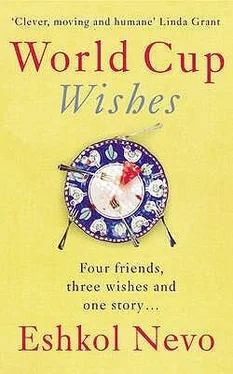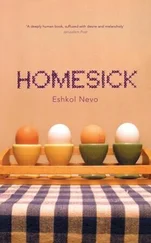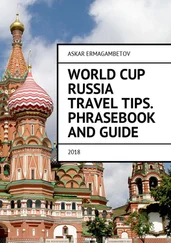Tell me, the timid girl asked, was there anything … I mean … was there anything about it in the papers?
Nothing, I admitted. I had rushed out to buy all the newspapers first thing in the morning. I read all the inside pages. There was no mention of it. Not one word. All week.
*
On the other hand, they devoted two or three inches to the event that launched ‘Our Right — The Jennifer Goldman and Ilana Abramowitz-Tanuri Non-Profit Organisation for Human Rights in the Health System’. Accompanying every story was a close-up photo of Amichai, and the brief text contained mainly direct quotes from the press release we’d handed out at the event (Ofir had said that journalists don’t like working too hard, so we should prepare a few quotable sentences for them beforehand).
The overall tone of the reports was quite favourable. One newspaper wrote that it was an ‘interesting initiative’. Another maintained that establishing the NPO was ‘a welcome idea’. A third took the trouble to print the NPO phone number at the end of the item. The next day, there were 5,421 voicemail messages on the answering machine Amichai had set up, and by the end of that week, almost 8,000 people had called. It turned out that Amichai’s initiative had broken through a locked door, had got under the public’s thick skin and sent an electric charge along an exposed nerve of Israeli society. And it turned out that among the callers were many professionals — lawyers, accountants, electricians — all of whom had personally experienced a violation of their rights and offered to volunteer their expertise for the NPO’s use.
Within only three months — and without leaving his job at Telemed, because ‘you don’t leave a good job’ and ‘I have subscribers who depend on me’ — Amichai, with the determination of a long-distance runner and the patience of a jigsaw-puzzle assembler, had succeeded in turning the NPO from an idea on paper to a living organisation.
The administrative backbone of the NPO consisted of four salaried employees, but most of the work was done by dozens of volunteers. Amichai himself divided his time between the day-to-day running of the organisation and meetings with senior officials in hospitals and in the Health Ministry to discuss the implementation of the pilot that would examine how the presence of mediators and interpreters from the Our Right NPO in a hospital accident and emergency department would help guard human rights in the institution.
Ofir and I followed the reports in the media about Amichai’s activities with proud surprise. It’s always weird to see someone you knew as a teenager becoming so successful in the grown-up world. You remember him choking on his first cigarette behind the basketball court — and now he was making hospital directors choke when he showed them the critical reports prepared by the NPO’s undercover volunteers. You remember him shaking in his boots as he stood in front of the teacher’s desk — and now he was banging on the Health Minister’s desk.
But there was something else here that was less comfortable to admit.
We had always been a bit disdainful of Amichai, perhaps because he was the least verbal of the three of us (and perhaps that’s why Ilana refused to get close to us? Perhaps she sensed that hidden current?). The three of us moulded Hebrew to serve our purposes. Ofir liked to be clever. Churchill liked to be precise. And I, perhaps because my parents never mastered Hebrew, insisted on knowing it inside and out. I read dictionaries in the bathroom as if they were novels. I turned on the radio every day at five to five to hear ‘A moment of Hebrew’. And I enjoyed inventing Hebrew substitutes for foreign words that the Academy of the Hebrew Language still hadn’t got around to working on.
I can’t really say if that attraction to words was what connected me to Ofir and Churchill from the beginning, or if we became alike in that regard only after our friendship had deepened. But we were already doing quite a bit of verbal jousting at school, and after the army, when the three of us chose professions in which language played a major role, our tendency to verbalise everything grew stronger and caused some of the people who spent time with us to raise their eyebrows — a tight-lipped smoulder is the hallmark of the manly movie star, so what’s all that talking?
Amichai, unlike us, always preferred doing to talking. And when he did speak, he spoke heavily and used outdated words like ‘swell’ or ‘way-out’, and when one of us entertained the others with a complex play on words, he was the last to understand. And he married someone who, at least outwardly, showed no great love for him. And there was that endless talk of his about studying shiatsu, which never came to anything. And those ridiculous attempts to eradicate the blotch on his neck. And his pathetic ‘brilliant ideas’ that we sometimes enjoyed, but more often made fun of.
And now, just like in the pavement shell game you see con artists running, the pea turns out to have been hiding under the most unexpected shell — in Amichai’s project, a project that the great, omniscient Churchill had declared ‘not serious’, that, at first, I didn’t think had a chance either. It was Amichai’s project that was taking off. That had financial support. And influence.
*
About a year after the NPO was established, the first scheme was initiated in the same failing hospital whose director had spoken to Amichai at the launch event.
A week later, the pilot was almost stopped. An Our Right representative was hit by a patient’s brother who thought that he and he alone was responsible for his brother’s death. A group of interns in one of the departments all threatened to quit, claiming that their shifts were inhuman. And in another department, doctors refused to cooperate with Our Right representatives, arguing that they would be violating the patients’ right to privacy if they did.
What have you done to me? the director shouted at Amichai. The situation has only deteriorated! But Amichai wasn’t fazed. For several moments, he let the director’s shouts crash over him like water on a wharf, and in the end, he said quietly: Micha, I don’t have to explain to you that it takes time to absorb changes. Especially in large organisations. That’s why I suggest that we judge on the basis of the long-term results.
How long? the director demanded to know.
At least three months, Amichai said.
After three months, an objective poll revealed that, along with the problems that it created, the presence of the Our Right representatives did indeed improve doctor — patient communication and significantly decreased the number of complaints.
In light of this, Amichai was invited to the Health Ministry to examine the possibility of expanding the scheme to additional hospitals, and he was asked to appear on several morning TV shows to explain the idea behind the NPO (he comes over really well on the small screen, Ofir said, because he projects something sincere. Notice that he never gets drawn into that carefree façade the presenters put on, but he still doesn’t come across as patronising).
During his appearances, many women called the studios to ask for the phone number of the widower with the earth-coloured eyes.
Amichai politely rejected all those interested women.
But why? I asked when he told me about it.
It’s too soon, he said. His heart was still mourning. In bed at night, he still reaches out to embrace Ilana. During the day, he still automatically calls her mobile to tell her about the little things that have happened to him. Every time he looks at the children, he sees her (Noam has her tiny freckles; Nimrod, her expression). Every time they play Aviv Geffen’s song, ‘Oh Ilana’, on the radio, he turns it off. Every time he hears an ambulance, he remembers that ambulance. Every time he hears a car alarm, he remembers that ambulance. Every time he … hold on a minute. He doesn’t want to talk about it. How did I drag him into talking about it? Talking about it only makes him feel terrible.
Читать дальше












